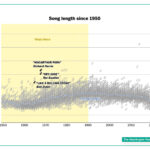Yuval Noah Harari, in his insightful book 21 Lessons for the 21st Century, posits a future where Artificial Intelligence (AI) not only surpasses human capabilities in many workplaces but also in songwriting. He suggests AI’s potential to understand and cater to individual emotional needs through music, crafting bespoke “Song Ai” experiences far more potent than human-composed tracks. Imagine AI creating the perfect happy song tailored to your unique mental state, instantly lifting your spirits.
However, this perspective might overlook a crucial element of what makes music profoundly moving. While songs certainly evoke emotions—joy, sadness, passion, nostalgia—their impact extends beyond mere emotional manipulation. Truly great songs inspire a sense of awe, and this awe is deeply rooted in the human condition, in our inherent limitations and our audacious drive to transcend them.
A sense of awe is almost exclusively predicated on our limitations as human beings.
It’s conceivable that AI could generate a song technically comparable to a landmark track like Nirvana’s Smells Like Teen Spirit. An AI could analyze the song’s components, replicate its energy, and even amplify the feelings of rebellion and excitement it evokes. But would such an AI-generated song truly capture the essence of what makes Smells Like Teen Spirit so impactful?
Listening to Smells Like Teen Spirit is not just about experiencing a surge of rebellious energy. It’s about connecting with the raw, unfiltered expression of Kurt Cobain, a young man who emerged from the obscurity of Aberdeen, Washington, carrying a weight of alienation and personal struggles. His music, born from human vulnerability and imperfection, resonated deeply with a generation. Similarly, consider Iggy Pop’s raw performance antics, Beethoven composing masterpieces in deafness, Prince’s electrifying Super Bowl performance, Nina Simone channeling pain into poignant love songs, Paganini’s virtuosity amidst broken strings, or Jimi Hendrix’s fiery guitar sacrifice.
We are listening to Jimi Hendrix kneel and set fire to his own instrument.
These moments in music history are not just about technical brilliance or emotional manipulation. They are powerful because they showcase human beings pushing beyond their perceived limits. AI, with its limitless potential and access to vast datasets, inherently lacks this struggle, this human ‘nerve’ to transcend limitations. Transcendence, by definition, requires something to overcome. If potential is limitless, what is there to transcend? Where does imagination find its purpose without the friction of limitation? Music’s power lies in its ability to touch the sublime, and the awe we experience comes from witnessing the audacious reach, the desperate attempt to surpass human boundaries, not simply the polished outcome.
So, to address the question of “song ai” and its potential: yes, AI could likely write a technically proficient and emotionally engaging song. But could it write a truly great song? One that inspires awe and resonates with the soul? Perhaps not. Greatness in music is not just about algorithms and optimized emotional responses. It’s about the human story, the struggle, the audacity, the nerve to reach beyond, and in doing so, touch something profound.

